LifestyleVisuals/E+ via Getty Images
In a recent article, I explained that now could be a good time to buy a rental property. That’s because:
-
Inflation is high and potentially accelerating.
-
Rentals allow you to borrow a lot of cheap fixed-rate debt.
-
The war in Ukraine is introducing new risks.
-
Diversification is growing in importance.
-
You may not want all your assets to be publicly-traded.
While I stand by that article, I think that quite a few people misunderstood its conclusions. A lot of people appear to have concluded that based on this article, they should favor rentals over publicly listed REITs when in reality, it is the opposite.
I strongly believe that REITs remain far better investments in most cases. My argument was simply that investing in rental properties may make sense as a tool to achieve even greater diversification. However, they are not a replacement for REITs, which remain far more important as part of a diversified real estate investment strategy.
In fact, I have 90% of my real estate allocation invested in REITs today, and only 10% in rentals. While I have already written quite a few articles on this topic, I wanted to write a quick follow-up on all the reasons why I think that REITs are superior investments in most cases.
Below I share a succinct summary of 10 points for you to consider. This is coming from someone who has been investing in both for over a decade and dedicated his career to real state investing.
Reason #1: REITs Are More Lucrative in Most Cases
I will start with this because it is probably the most contested argument.
Rental investors argue that they are able to achieve higher returns by using high leverage and skipping management costs. But their argument misses several important points that tip the balance in favor of REITs.
First off, REITs also use leverage. When you invest in a REIT, you are providing the equity and it is the equity value that you see traded on the stock market. It is therefore a misconception to think that rentals are more rewarding because of leverage as both enjoy the same benefits.
Secondly, you cannot ignore management costs by simply assuming that you are going to be the manager. Your time still has value and the opportunity costs need to be taken into account. If you could earn $30 per hour working a regular job, but you use your productive time to work on rentals, you are effectively losing $30 each hour. When you properly account for that, the management of rental properties is extremely inefficient and costly when you are lacking scale. Often, most of your returns are actually coming from labor, and not from the investment itself. REITs, on the other hand, have a huge scale, which results in more cost-efficient management even despite paying high salaries for the managers.
But it does not stop there.
Several studies argue that REITs are much more lucrative investments because they have many levers to boost returns that rental investors simply don’t have. This includes the following:
-
Scale Cost Advantage: REITs save costs on all fronts by having a scale advantage. Not just the management, but also building costs, renovation projects, financing costs, brokerage, etc.
-
Scale Return Advantage: The scale of REITs also give them preferential relationships with major tenants. This helps them secure better leases, faster, and with better terms, creating more value in the process.
-
Spread Investing: REITs are able to raise capital through public equity markets to buy more assets. As long as they can raise capital at a cost that’s inferior to their expected returns, there is a spread to be earned that boosts their growth rate. This is how REITs are commonly able to grow their dividend by 5-8% per year, whereas most rental investors only grow rents by ~2% per year. This difference in growth adds up over time.
-
Development Projects: REITs don’t just buy stabilized assets. They also buy land, get permits, build themselves, lease the property, etc. to create more value and earn higher returns.
-
Value-Add Projects: REITs also buy underperforming assets and then work on them to fix issues, grow rents, and earn superior returns. You need to be a dedicated professional to identify and complete such projects.
-
Real Estate Related Businesses: REITs also operate other businesses that are synergetic to their real estate investments. As an example, they may offer property management services to other investors to earn additional fees.
-
Better Alignment of Incentives: REIT managers typically own a large stake in the company. The value of their stake is commonly a multiple of their salary, and their salary is also tied to shareholder value creation. As such, a REIT manager will typically do a much better job than a regular property manager that simply takes a fee on your rental income.
-
REITs Avoid Worst Case Scenarios: REITs are much more conservative with their leverage than most rental investors and mainly target higher quality, higher growth properties. Naturally, this results in lower yields in the immediate terms, but it also results in more growth over time, less pain during downturns, and higher returns over the full cycle.
Therefore, it would be logical for REITs to outperform rental properties. After all, they are targeting the same asset type, both use leverage, both REITs have many more levers to boost returns.
But don’t take this just from me. Several independent studies confirm this point. Once you properly account for the indirect management cost of rental properties, REITs outperform rental properties by ~2-4% per year on average, over a full market cycle:
REITs outperform private real estate (Cambridge Research) REITs outperform private real estate (EPRA) REITs outperform private real estate (Refinitiv Datastream)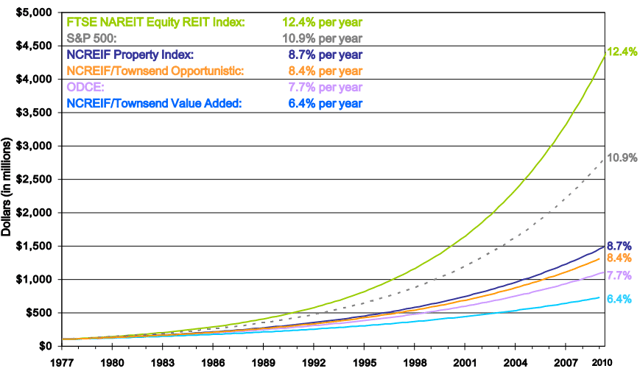
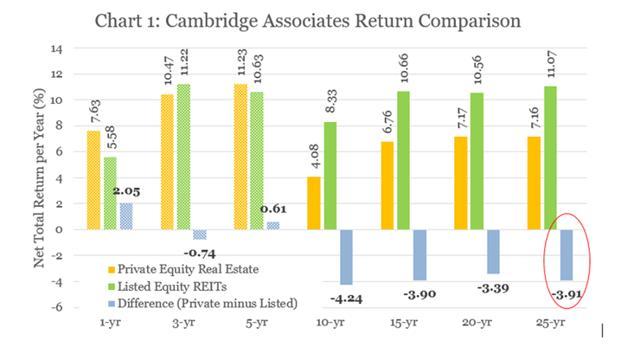
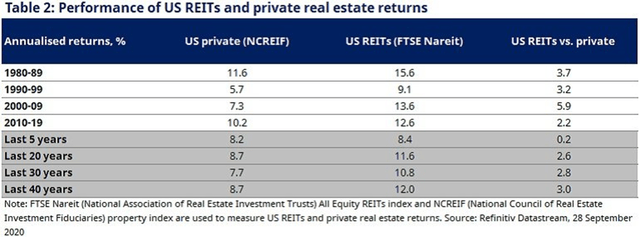
Note that this is the average of the REIT market vs. the average of the rental market. This is not to say that rental properties can’t be more lucrative than this. Surely, there are some exceptional deals out there. But the same is true for REITs. To have an objective, apple-to-apple comparison of returns, we need to look at averages, and studies and logic would tell you that REITs are likely to be more rewarding investments in most cases.
Reason #2: REITs Give You The Benefits of Leverage Without Putting Your Personal Credit On The Line
We already explained that REITs give you the same benefits of leverage. You provide the equity and the REITs then add debt to it.
However, a big difference is that REIT investors aren’t signing on any of the loans and therefore, their liability risk is limited. They are not putting their personal credit on the line, which is a huge risk mitigation that most rental investors don’t appear to comprehend.
If things go south, REIT investors cannot lose more than what they invested. However, there are countless stories of rental investors that go bankrupt each year because they used too much leverage and were on the hook for it.
Reason #3: REITs Limit Your Personal Liability
REITs don’t only protect you from the liability of leverage. They also protect you from all other sorts of liability risks.
Since you are just a minority shareholder of a limited liability corporation, you won’t ever have tenants, contractors, brokers, etc. sue you.
If you own rental properties long enough, it is nearly certain that you will eventually face some legal disputes. These will take a lot of financial but also emotional resources. In a worst-case scenario, you could lose it all and then some if you are found guilty of something, whether intentional or not.
Just to give you one example: I have seen cases of landlords being sued by the tenant who developed asthma due to the mold that grew in the bathroom, which he didn’t ventilate properly. If the landlord is found guilty, the consequences could be substantial.
When you invest in REITs, your personal liability is protected and the REITs are used to dealing with these situations and have the scale to hire lawyers in a cost-efficient way when needed.
Reason #4: REITs Are Completely Passive
This is a very important and hugely underappreciated point in my opinion.
Rental properties are work-intensive. Owning rentals is more similar to running a business than owning passive investments.
Even if you assumed that REITs were going to be somewhat less rewarding, I think that they would still provide better hassle-adjusted returns because they are completely passive.
Ask yourself: Would you prefer to earn a passive and safer 12% annual return or a work-intensive and riskier 14% return?
Reason #5: REITs Are Liquid
Most of my REIT investments are long-term oriented and therefore, I don’t really need the daily liquidity.
However, the liquidity is still a major advantage because it allows me to efficiently add more capital to my investments each month as soon as the cash becomes available.
If you are buying rentals, you will need to save more months or years with your cash sitting in an account, losing its value to inflation.
If you invest in REITs, you can immediately and efficiently put that capital to work. Your capital scales much better and you don’t lose any compounding benefits.
Reason #6: REIT Investors Pay No Transaction Costs
When you buy a rental property, you will commonly pay 5-10% in diverse transaction costs on day 1. That money is lost immediately.
If you put 20% down, and you pay 5% in transaction cost, that essentially means that your equity value is down 25% on the first day of your investment, and you then need to make up for this before you start earning a return.
In comparison, REIT investors pay no transaction costs because they are simply buying an interest in an already existing portfolio of properties.
Simply saving these transaction costs makes a huge difference in your returns.
These fees may also reoccur someday as you sell your property.
Reason #7: REITs Are Highly Tax Efficient
There are misconceptions that REITs are less tax-efficient than rentals. In reality, I pay fewer taxes investing in REITs in most cases.
That’s because:
-
The bulk of REIT returns (2/3 or even 3/4) comes from appreciation, and not income. REITs are more growth-oriented investments and all that appreciation is tax-deferred and taxed advantageously.
-
REITs distribute only ~70% of their cash flow. The remaining 30% goes untaxed since REITs don’t pay corporate tax and can be reinvested.
-
A portion of the distribution is often classified as “return of capital” which is not taxed.
-
The partition of the distribution that’s taxed enjoys a 20% deduction.
-
Finally, you can put your REITs in a tax-deferred account.
Rental investors mistakenly think that their investments are tax-efficient due to depreciation but in reality, this is a trap as your cost basis goes down, and you get hit with a huge tax bill if you someday sell your property.
Investors are then stuck holding their properties forever, whether it makes sense or not. Losing flexibility has a big indirect cost that needs to be considered as you consider the tax efficiency of your investments.
A REIT investor can rapidly switch to other market sectors if real estate becomes unattractive. Rental investors cannot and it can cost them dearly.
Reason #8: REITs Allow You To Diversify
The only free lunch in investing is diversification.
Yet, rental investors are very limited in their ability to diversify because each investment is a big-ticket.
Owning a concentrated, illiquid, highly leveraged investment may pay off handsomely, but it is also very risky.
REITs commonly own 100s, if not 1000s of properties, which greatly mitigate risks. Moreover, investors can easily build a portfolio of ~20 REITs to diversify further.
It results in far better risk-adjusted returns over time. A diversified REIT investor has never lost money in the long run, but concentrated rental investors lose their shirts all the time.
Reason #9: REITs Give You Far More Investment Options
REITs today invest in over 20 property sectors:
- Office: e.g. Boston Properties (BXP)
- Industrial: e.g. Prologis (PLD)
- Apartment: e.g. Mid-America (MAA)
- Retail: e.g. Kimco (KIM)
- Hotel: e.g. Host Hotels (HST)
- Net Lease: e.g. Realty Income (O)
- Senior housing: e.g. Ventas (VTR)
- Skilled nursing: e.g. Omega Healthcare (OHI)
- Hospital: e.g. Medical Properties Trust (MPW)
- Medical Office: e.g. Physicians Realty Trust (DOC)
- Manufactured Housing: e.g. Sun Communities (SUI)
- Single-Family Rental: e.g. Invitation Homes (INVH)
- Student Housing: e.g. American Campus Communities (ACC)
- Self Storage: e.g. Public Storage (PSA)
- Timberland: e.g. Weyerhaeuser (WY)
- Farmland: e.g. Gladstone Land (LAND)
- Billboard: e.g. Lamar (LAMR)
- Data Centers: e.g. Digital Realty (DLR)
- Ground Lease: e.g. Safehold (SAFE)
And REITs also exist in over 30 countries:
REITs around the world (EPRA)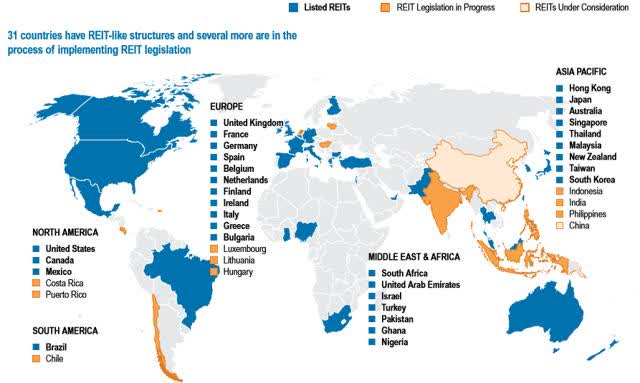
As such, investors have an almost endless number of potential investment opportunities, ranging from cell towers in South Africa to apartment communities in Texas, and even data centers in Singapore.
Rental investors are limited to their own backyard. They could invest far from home, but in most cases, that’s a bad idea as you won’t be there to solve issues and will have to always rely on other people.
Reason #10: REITs Are Cheap, But Rentals Are Expensive
Finally, and perhaps most importantly, there are better and worse times to invest in REITs and rentals.
Today, REITs remain discounted. They are still barely getting back to pre-Covid levels, despite the rapid property price appreciation that has occurred over the past 2 years.
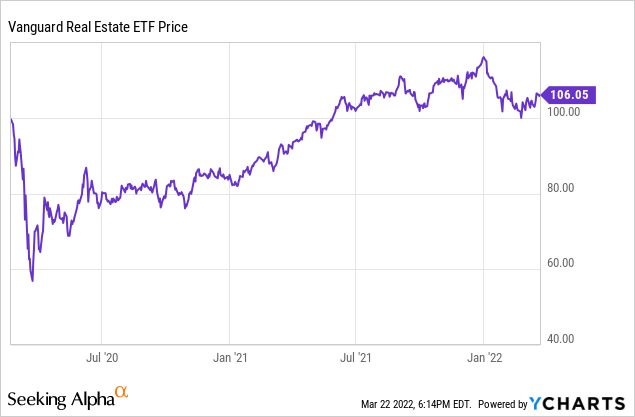
Private properties, on the other hand, are priced at large premiums to pre-Covid levels, and some even call it a bubble.
Rental property (Invitation Homes)
As a result, a lot of REITs are today priced at large discounts relative to the market value of their assets.
If you know where to look, some sectors of the REIT market are especially opportunistic right now. They dropped early into the pandemic and failed to recover.
To give you a few examples:
- Most net lease REITs are priced at a 20% discount to pre-Covid levels despite generating record cash flow and hiking dividends.
- A number of retail REITs are priced at up to 30-40% discounts to NAV due to Amazon (AMZN) fears, despite owning service-oriented properties.
- Etc.
The point here is simply that is a better time to invest in discounted REITs than in expensively priced rental properties. The opposite may be true someday in the future, but right now, REITs are far more opportunistic in most cases.
Bottom Line
To summarize in three bullet points:
-
REITs are more rewarding in most cases.
-
They are far safer as you get limited liability, liquidity, and diversification.
-
And finally, they are completely passive, which allow you to focus on your career to earn money to invest rather than deal with the inefficient management of rental properties.
All in all, REITs provide far better risk-and-hassle-adjusted returns in most cases, and this is why I favor REITs over rentals in most cases. Exceptions exist, of course, and I am not completely against the idea of buying rental properties. But if you compare the two, REITs are superior, nine times out of ten.


Be the first to comment